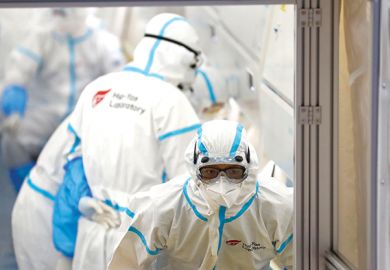Covid-19 has eroded not only academics’ unease about publishing preprints – studies yet to undergo peer review – but also the media’s unease about reporting them. Now, research has found that media vary considerably in how they convey these studies’ unreliability.
An analysis has found that only three in five media stories acknowledged the inherent uncertainty of research that had not been independently evaluated. And surprisingly, the outlets more likely to do so included generalist news websites such as Business Insider and The Guardian and web portals such as MSN.
But The Conversation, which sources its content from academic contributors, proved relatively unlikely to identify studies as preprints – despite an editorial policy to avoid reporting unreviewed research at all.
The study, published in the journal Health Communication, tracks patterns in academic publishing and the reporting of science outside the scholarly media – and how crises can influence these patterns.
Lead author Alice Fleerackers, a doctoral student at Simon Fraser University in Vancouver, said that the international community had been able to develop Covid-19 vaccines in record time partly because research had been disseminated quickly through preprints. But this meant that academic work came to public attention more rapidly.
Ms Fleerackers said that researchers should not stop using preprints, but they should be prepared for media coverage of anything they “put out into the world” from peer-reviewed papers to preprints, blog posts and even tweets. “It goes against the norms of journalism to expect them to hold off just because you don’t feel it’s right yet.”
And while scientists should always stress the limitations of their studies to media, this was “especially pertinent” in the case of preprints. The study had been conducted at the pandemic’s outset “when basically every journalist had to be a science journalist” and many were unfamiliar with the scientific method.
The team focused on 15 media outlets’ coverage of 100 preprint papers about Covid, analysing 457 stories. The papers had been posted on medRxiv and bioRxiv, two prominent preprint servers, between January and April last year.
While the stories routinely included hyperlinks to the papers, one-fifth did not clearly indicate that they were linking to original research and about twice as many failed to mention that the studies were preprints, preliminary, unreviewed or unverified.
The outlets most likely to highlight the studies’ uncertainty were technology magazine Wired and medical websites Medscape and News Medical. Those least likely were The Conversation and online publishing platform Medium.
Ms Fleerackers said that authors and editors at The Conversation may not have felt the need to stress the preliminary nature of studies because its readers were well versed in the scientific process. But its articles were often carried by other outlets with less science-savvy subscribers.
The team said that its findings were “encouraging” overall given that research into media coverage of preliminary health science papers before the pandemic had found that just one in five mentioned their unverified nature. “Media may be more attentive to addressing scientific uncertainties when such transparency has important implications for public health,” the paper says.
Register to continue
Why register?
- Registration is free and only takes a moment
- Once registered, you can read 3 articles a month
- Sign up for our newsletter
Subscribe
Or subscribe for unlimited access to:
- Unlimited access to news, views, insights & reviews
- Digital editions
- Digital access to THE’s university and college rankings analysis
Already registered or a current subscriber?











